Key takeaways:
- Effective coordination enhances emotional connectivity among speakers, resulting in a more engaging and memorable audience experience.
- Selecting speakers based on expertise, engagement, and willingness to collaborate is crucial for creating enriching discussions.
- Clear communication channels and collaborative tools can significantly reduce confusion and increase collaboration among speakers.
- Flexibility and proactive communication are essential for handling last-minute changes smoothly, fostering a positive environment and teamwork.
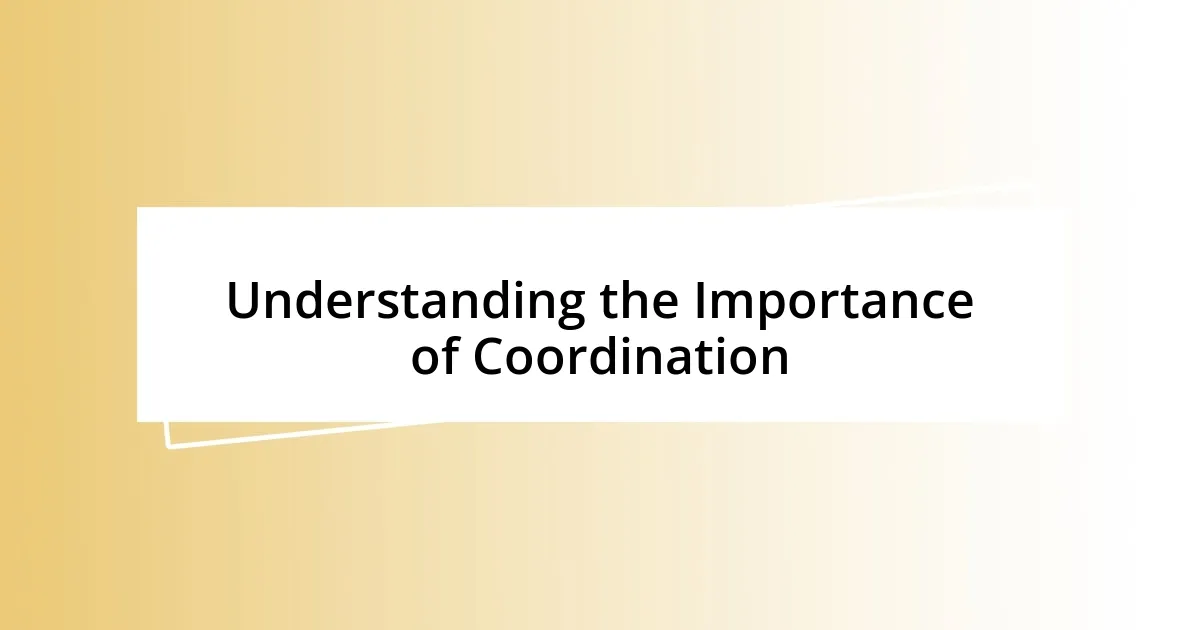
Understanding the Importance of Coordination
When I think about coordination, I realize it’s not just about managing logistics—it’s about forging connections. Recently, I worked on a panel event where diverse speakers brought varying perspectives on mental health. Without a solid coordination strategy, the attendees would have missed out on truly enriching dialogues that resulted from those interactions.
One time, while coordinating a multi-speaker conference, I noticed how the dynamic shifted when speakers engaged with each other rather than just presenting their own views. It was like watching a dance unfold on stage! And the audience could feel that energy. Have you ever experienced that stunning moment when conversations flow naturally? I find that emotional connectivity among speakers can create a vibrant atmosphere, making it essential for a successful event.
Proper coordination also ensures that each voice is heard while maintaining a cohesive narrative. I’ve seen firsthand how a well-timed question can spark a robust discussion, igniting passions and insights that weren’t initially on the agenda. Isn’t it fascinating how coordination shapes interactions? It not only enhances the audience’s experience but also uplifts the speakers, leading to memorable moments that leave lasting impressions.

Identifying and Selecting Speakers
Identifying and selecting the right speakers is a crucial step in the coordination process. I’ve discovered that a speaker’s expertise, enthusiasm, and ability to engage with the audience play significant roles in the selection process. For instance, during a recent event on technology and education, I found that the speaker who could share personal stories alongside their data-driven insights truly captivated the audience. Have you ever noticed how storytelling can bridge gaps between complex concepts and everyday understanding?
It’s not just about credentials; it’s about the energy a speaker brings to the event. I once had a speaker who was an expert in alternative energy but could weave a narrative that connected deeply with attendees’ everyday lives. That level of relatability transformed the session into not just an informational talk but a passionate discussion. Selecting speakers who resonate on a personal level is what I strive for, as they help create a more enriching experience for everyone involved.
Another key factor in selecting speakers is their willingness to collaborate. I remember working with a group who were initially hesitant to engage with one another. By facilitating conversations and outlining an agenda that encouraged interaction, I saw them transform into a unified front, sharing ideas that sparked incredible discussions. This taught me valuable lessons about the dynamics of speaker selection and the impact it has on an event’s success.
| Criteria | Details |
|---|---|
| Expertise | Relevant knowledge in the subject matter |
| Engagement | Ability to connect with the audience |
| Collaboration | Willingness to interact with other speakers |
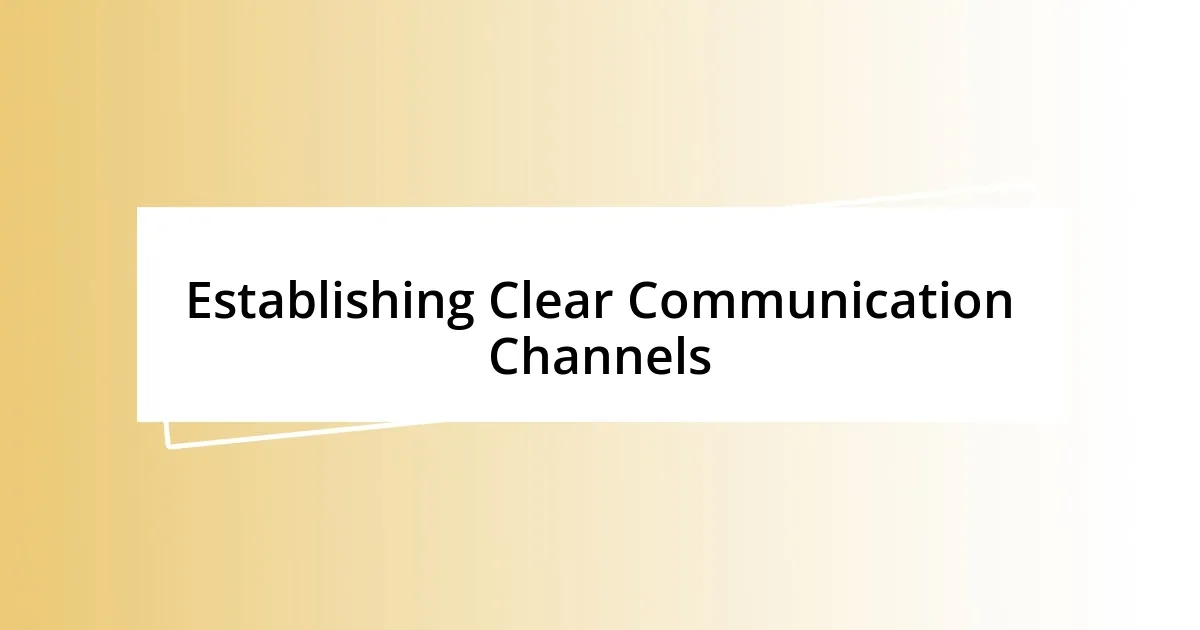
Establishing Clear Communication Channels
Establishing Clear Communication Channels
One essential element I’ve learned in coordination is the need for clear communication channels. In a recent project, I used a shared online platform where all speakers could access materials, updates, and timelines. By creating this centralized hub, I noticed a dramatic decrease in confusion and an increase in collaboration. It almost felt like having a backstage pass to a concert, where everyone could stay informed and in sync.
To ensure effective communication, I recommend the following strategies:
- Utilize Collaborative Tools: Employ platforms like Slack or Trello to keep discussions organized and ongoing.
- Set Regular Check-Ins: Schedule brief meetings leading up to the event to review progress and address any issues.
- Encourage Openness: Foster an environment where speakers feel comfortable sharing concerns or ideas, which can lead to richer interactions.
- Create a Feedback Loop: After meetings or events, solicit feedback to refine your communication process for future collaborations.
It’s all about building a sense of community among speakers, making it smoother for everyone to interact and engage deeply. When I see speakers confidently collaborating from the get-go, I know we’re on the path to an impactful and cohesive event.
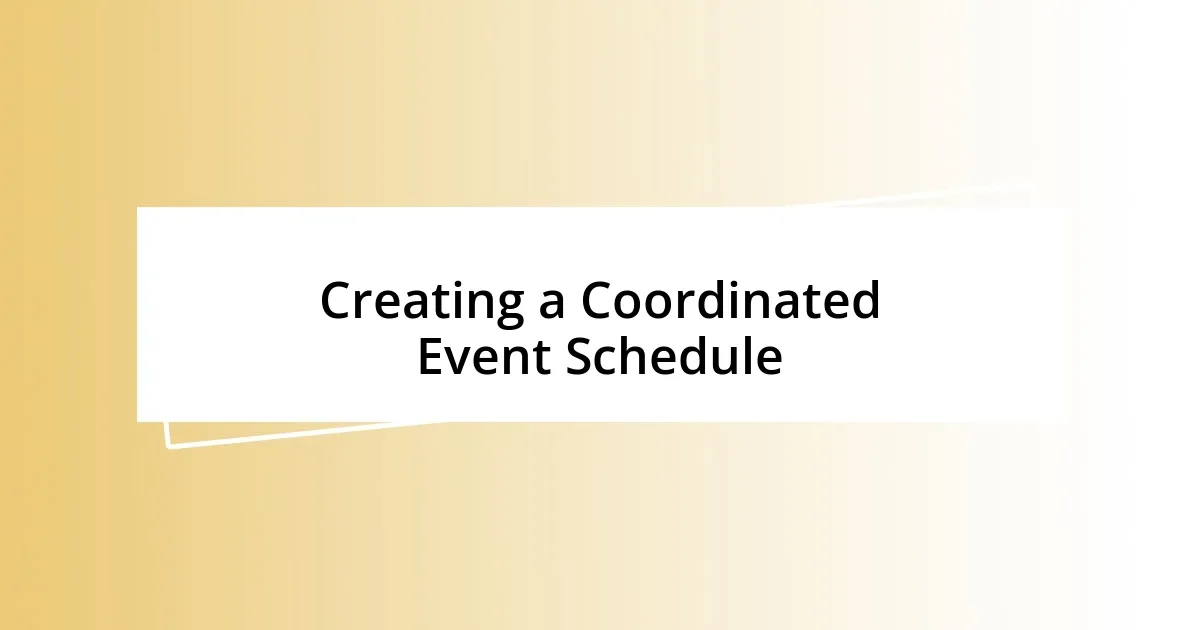
Creating a Coordinated Event Schedule
Creating a coordinated event schedule goes beyond simply assigning time slots; it requires a keen understanding of each speaker’s flow and how their presentations complement one another. During one of my events, I noticed how placing two speakers back-to-back led to a beautiful synergy, where the first speaker’s ideas seamlessly transitioned into the second’s. Isn’t it fascinating how timing can enhance the overall experience? By carefully crafting the agenda, I could foster a narrative that resonated throughout the entire event, keeping the audience engaged and attentive.
I have often found that sharing the schedule with all speakers early on allows for a collaborative approach to refining it. This transparency ensures everyone feels involved in the planning process, which can prevent potential scheduling conflicts. I remember a time when a speaker flagged a scheduling issue days before the event. Instead of stressing out, we rearranged the schedule to allow for a seamless flow, ensuring that each speaker had enough time to shine. Have you ever experienced a moment when flexibility turned a potential disaster into an opportunity?
In my experience, incorporating buffer time between sessions is essential. It acknowledges the unpredictable nature of live events and gives speakers a moment to breathe, gather their thoughts, and connect with attendees. One time, after a particularly intense session, I noticed the audience buzzing with excitement. That extra ten minutes allowed them to process and discuss what they’d just heard, enriching the overall atmosphere. Isn’t it amazing how a little breathing room can amplify engagement?
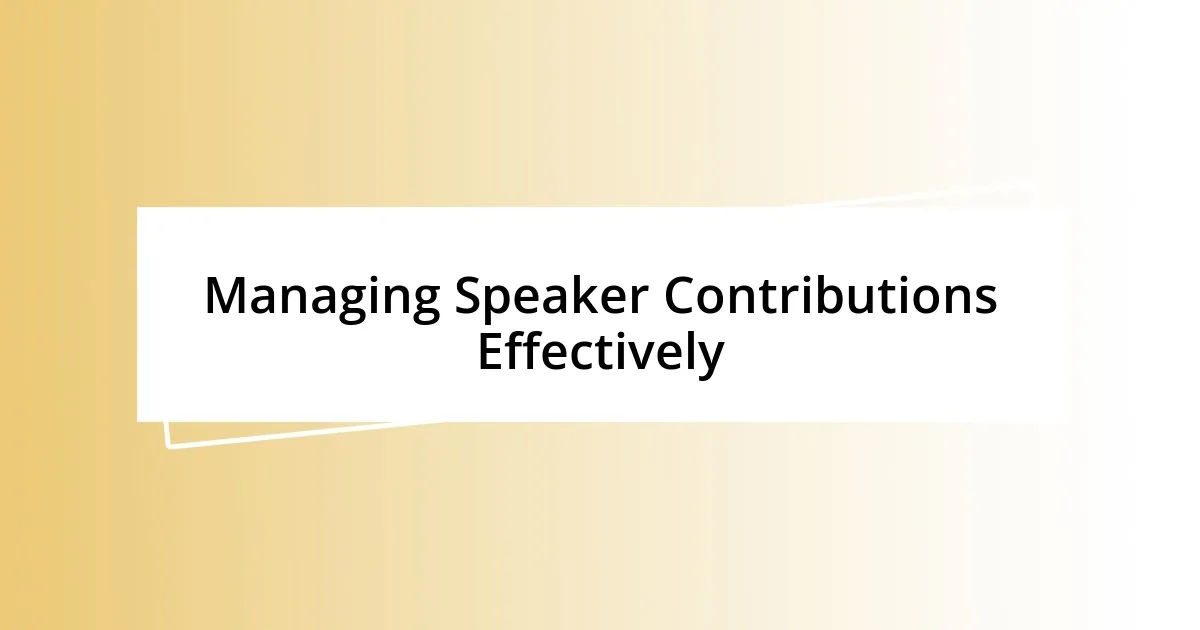
Managing Speaker Contributions Effectively
Managing speaker contributions is a delicate balance, and I’ve learned that active listening can make a world of difference. During a panel I orchestrated, I noticed how one speaker inadvertently overshadowed the others simply because they were more vocal. By gently steering the conversation and inviting quieter speakers to share their insights, I transformed the session into a rich tapestry of ideas. Have you ever felt that rush of satisfaction when everyone has their moment to shine?
I’ve found that setting clear expectations upfront fosters accountability and encourages engagement. For instance, I once worked with a group where each speaker was given specific time allocations for their contributions. When the day came, it became evident that some speakers were eager to exceed their time, but a friendly reminder helped maintain balance. This experience taught me that it’s possible to be firm yet friendly; after all, everyone is there to support one another.
Engaging speakers in a pre-event rehearsal is another effective strategy. I usually organize a casual run-through where each speaker can practice and receive constructive feedback. I still remember how one speaker, who was initially anxious, gained confidence after hearing positive comments from their peers. This not only enhanced their delivery but also fostered camaraderie among the group. Have you ever observed how collaboration breathes life into individual contributions? It’s magic when everyone is united toward a shared goal.
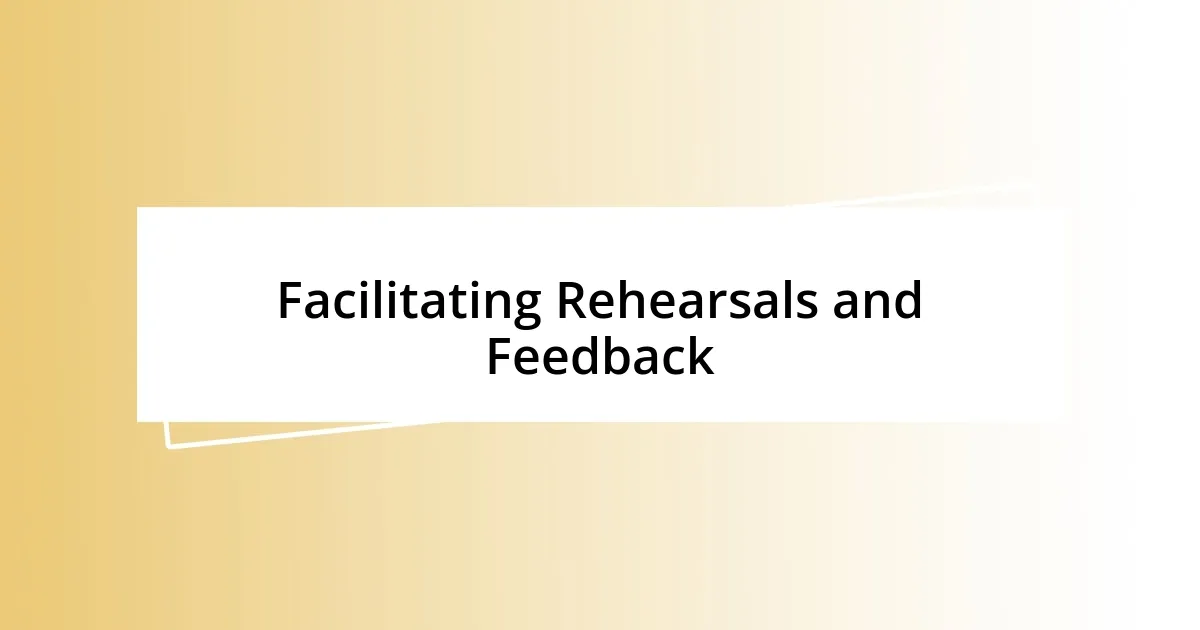
Facilitating Rehearsals and Feedback
Facilitating rehearsals and feedback is one of the most enjoyable parts of coordinating multiple speakers. I like to create an atmosphere of openness, where everyone feels comfortable sharing their thoughts. Once, during a rehearsal, one speaker expressed concern about their pacing. After discussing it together, we decided to implement a few pauses. This small change made their delivery much more impactful. Isn’t it incredible how minor adjustments can lead to significant improvements?
I’ve realized that feedback can be tricky if not approached delicately. I once led a session where I encouraged everyone to share their honest opinions, but I also emphasized the importance of constructive criticism. One speaker had a habit of using jargon that was hard for the audience to grasp. Instead of calling them out, I framed my feedback as a shared learning experience. I asked, “What if we simplified this concept together?” This collaborative spirit transformed what could have been a tense moment into an opportunity for growth. Have you ever seen how mutual respect during feedback sessions can foster deeper connections among speakers?
During rehearsals, I love incorporating interactive elements. For example, I introduced peer evaluations where everyone could provide written insights to one another. I recall one occasion when a quieter speaker received commendations on their storytelling ability, which surprised them. Their expression of joy was priceless, and I could feel the collective encouragement lifting the group’s energy. Isn’t it fascinating how fostering a supportive environment can spark such enthusiasm? Facilitating this kind of positive interaction not only enhances individual performances but also solidifies the sense of team.

Handling Last-Minute Changes Smoothly
Last-minute changes are inevitable, and how I handle them can make all the difference. I remember a time when one of my speakers had to drop out just hours before their scheduled talk due to an emergency. Instead of panicking, I quickly reached out to a backup speaker, who was thrilled to step in. It was a reminder that flexibility is key—when I stay calm and adaptable, it encourages everyone else to do the same. Have you ever noticed how a composed leader can uplift the entire team’s morale?
In moments like this, communication becomes crucial. I make it a point to inform all speakers about any changes immediately. During one event, I had to adjust the speaking order while the session was already running. I sent out a quick notification through our group chat, and you could sense the collective breath of relief. They appreciated being kept in the loop, which reinforced our sense of teamwork. How do you think clear communication impacts a group faced with sudden adjustments?
It’s also essential to reassure the speakers about their capabilities. After that unexpected change, I took a moment to chat with the new speaker to boost their confidence. I said, “You’ve got this! Just share your passion, and the audience will resonate with you.” They delivered an outstanding presentation, and their energy was palpable. I find that fostering confidence can turn what seems like a crisis into an opportunity for growth. Have you experienced the power of encouragement in high-pressure situations?












